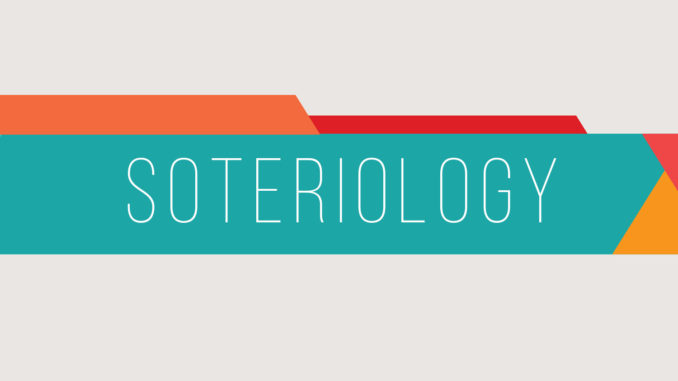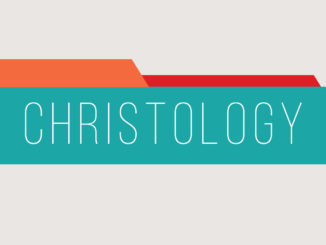
Soteriology is the doctrine of salvation (from the word Greek word for salvation, soteria). As a field of study, soteriology broadly includes doctrines related to evangelism, election, atonement theories, assurance, etc.
… dodging the doctrine of savlation can only harm us. Click To TweetScriptural Support
The Bible is a salvation-shaped book that, in many ways, speaks to soteriological issues from beginning to end. Still, a few essential passages build a soteriological foundation for the Christian faith. We will survey just three. The first shows the exclusivity of salvation. In Acts 4, Peter is under arrest by the Jewish leaders and uses his trial as an opportunity to defend the power of Jesus. Not only is the name of Jesus powerful, but Christ is also the exclusive source of salvation. Acts 4:2 says, “Nor is there salvation in any other, for there is no other name under heaven given among men by which we must be saved.” Sinners find salvation in Jesus or not at all.
The second passage demonstrates that Christ’s death dealt with the problem of sin. As an encouragement to suffering churches, 1 Peter refers back to the exemplary death of Christ, writing, “For Christ also suffered once for sins, the just for the unjust, that He might bring us to God, being put to death in the flesh but made alive by the Spirit.” (1 Peter 3:18) Soteriology is not rooted in a philosophical theory but in historical events: the just life, bodily death, and glorious resurrection of Jesus. The reason Jesus came was to deal with the sins of the unjust and to “bring us to God,” ultimately, solving the problem of separation that began in Genesis 3.
One final foundational passage explains that God demands faith as the human response to the work of Christ. In Ephesians 2:1-10, Paul paints a vibrant portrait of the believer’s transition from lost to found, highlighting God’s grace throughout. In verses 8-9, Paul says, “For by grace you have been saved through faith, and that not of yourselves; it is the gift of God, not of works, lest anyone should boast.” Paul pictures God’s gracious offer of salvation as a gift that squashes pride since no law-keeping or good deeds can merit salvation. God graciously works through faith, giving believers nothing in which to boast.
Historical Perspective
While orthodox Christians may agree on the exclusivity of the cross of Christ, the mechanics of salvation remain a source of debate. Since the first century, Christians thinkers have sought to clarify exactly how Christ’s death accomplishes salvation. Atonement theories represent their attempts to make sense of Scripture’s witness and, therefore, are more valuable when they are true to the whole counsel of the Bible. We will briefly survey three atonement theories popular in Christian history. First, the Incarnational Theory, which was prominent just after the New Testament era, presented salvation as becoming more like God. Athanasius wrote that Jesus became human so that believers might become divine (see 2 Peter 1:4). A second theory is sometimes called the Classical Theory because it was common among believers in the first millennium but is more commonly known as Christus Victor (Latin for “Christ the Victor”). Theologians such as Augustine and Origen saw the cross as the crucial victory over the powers of evil that freed slaves to sin (see Hebrews 2:14). Evangelicals today commonly hold to the third theory, the Penal-Substitution Theory. Penal-Substitution depicts God as the Divine Judge, sin as a transgression against God’s commands, and Christ as the substitute for the believer’s penalty (see 2 Corinthians 5:21). Because of its theological depth and Scriptural breadth, the Penal-Substitution Theory is the basis for most evangelical Gospel presentations and discussions of atonement today.
Practical Application
We cannot overstate the impact of the doctrine of soteriology. We care about other doctrines only because our God is a saving God. Likewise, soteriology is what differentiates Christianity from religions that demand obedience to secure a god’s favor. An unfortunate result of several centuries of heated debate is that believers now avoid discussing soteriology to preserve Christian unity. Conflicts between Calvinists and Arminians, the Free-Grace and Lordship-Salvation camps, or those with differing views of assurance make many believers nervous to discuss soteriology with others. This ought not to be. Soteriology aids Christian growth, so dodging the doctrine of salvation can only harm us. We will fail to grow in our worship if we fail to think upon the magnitude of Christ’s death. We will stifle sanctification if we do not grow in our understanding of the Gospel. And we will miss the opportunity to learn Christian charity if we refuse to discuss sensitive theological topics with brotherly love. We must devote as much energy to discussing where we agree (the exclusivity of Christ, centrality of the cross, and necessity of faith) as to debating where we disagree. And, let us never forget that, because of Christ, soteriology is Good News.
Click here to read the Introduction to the series, Why Study Theology
Click here to read part one of Rooted: An Introduction to Systematic Theology, Bibliology
Click here to read part two of Rooted: An Introduction to Systematic Theology, Theology Proper (available October 29, 2019)
Click here to read part three of Rooted: An Introduction to Systematic Theology, Christology (available October 31, 2019)
Click here to read part four of Rooted: An Introduction to Systematic Theology, Pneumatology (available October 31, 2019)
Click here to read part five of Rooted: An Introduction to Systematic Theology, Angelology (available November 1, 2019)
Click here to read part six of Rooted: An Introduction to Systematic Theology, Ecclesiology (available November 4, 2019)
Click here to read part seven of Rooted: An Introduction to Systematic Theology, Anthropology (available November 5, 2019)
Click here to read part eight of Rooted: An Introduction to Systematic Theology, Hamartiology (available November 6, 2019)
Click here to read part nine of Rooted: An Introduction to Systematic Theology, Soteriology (available November 7, 2019)
Click here to read part ten of Rooted: An Introduction to Systematic Theology, Eschatology (available November 8, 2019)
Click here to read part eleven of Rooted: An Introduction to Systematic Theology, Dispensationalism (available November 8, 2019)



